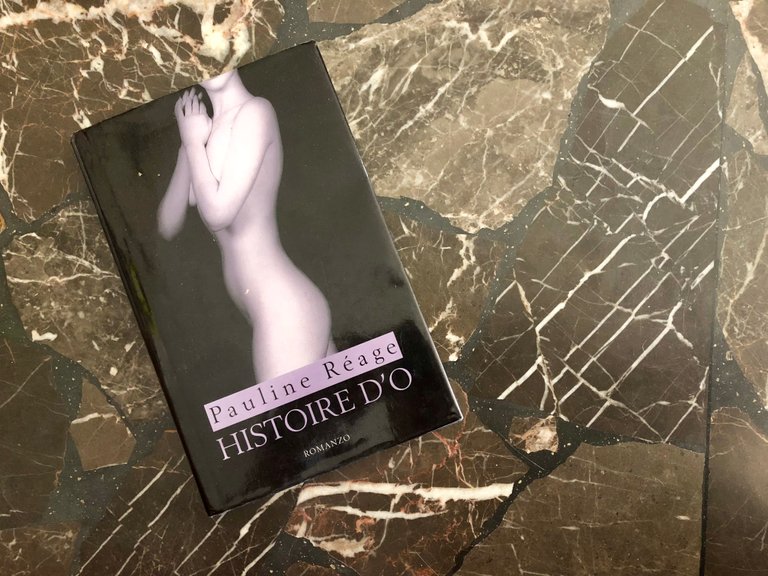
HISTOIRE D’O
Pauline Réage
First published in France by Jean-Jaques Pauvert in 1954.
First English edition by Olympia Press, 1965.
That same year, a U.S. version was also published by Grove Press.

Her lover one day takes O for a walk in a section of the city where they never go - the Montsouris Park. After they have taken a stroll in the park, and have sat together side by side on the edge of a lawn, they notice, at one corner of the park, at an intersection where there are never any taxis, a car which, because of its meter, resembles a taxi.
"Get in," he says. She gets in.
Plot
O is a beautiful young woman working as a fashion photographer in 1950s Paris, very much enamored of her lover, René. One day, as they’re taking a romantic walk in the park, her lover leads her to a car that will take them to Roissy, on the outskirts of Paris. On the way, he instructs her to remove her underwear and any item preventing easy access to her intimate parts. He then tells her that he’s taking her to a chateau where she will remain a while to be instructed in how best to please him. She shall have to be obedient, submit to any order, and ask no questions, all for the sake of his love. O accepts these terms and is left alone at the entrance.
At the chateau, O finds a secret society devoted to sadistic male domination over female slaves and begins her journey in submission. Led, at first, by her great love for René she allows her new masters to use, abuse and torture her in any possible way, emerging at last as a perfect paragon of submission. As she returns to her life, her job, and her affair with René she keeps her new rules and mindset with her, delighting in her newly discovered self more than even her lover. But René has never been the intended recipient of O’s servitude and soon she’s introduced to another man, an older English gentleman with particular ties to René, who claims O for his own.
O is initially perplexed at this new situation, but she’s well aware by now that what she’s always craved is not René but her own submission. That’s her ultimate raison d’être, and that’s the reason why she gladly submits to Sir Stephen, finding in him, at last, the true Master she needs.
Characters
O. Our protagonist, the focal point of the narration and yet the most mysterious character in the whole novel. We’re given ample insights into her thoughts and feelings, and yet we teeter perpetually on the edge with her. Who is she? What does she really want? Who does she love? Nothing exemplifies the author’s constant teasing about this character more than the fact that we never even learn her name.
René. A lover, a beacon, an ideal. At first. We see him through O’s besotted stare and the narration initially presents him as a virile, authoritative figure. Strong enough in his knowledge of O’s devotion as to leave her at the chateau for instruction. And yet, as O blossoms under her new regime, René withers in our consideration becoming less and less able to be the owner O deserves. The discovery of his relationship with Sir Stephen, in particular, serves as a turning point in definitely establishing his character.
Sir Stephen. His appearance later in the novel is a twist hardly anticipated and yet, upon reflection, constitutes a natural progression in O’s growing self-awareness. By the time Stephen is introduced, O’s reflections have already been hinting at an imbalance of sorts having developed between René and her. Sir Stephen steps in and suddenly O’s training and all her yearnings seem to find new and more terrible meaning. He takes it upon himself to further O’s debasement and lead her to her full potential in a role he cleverly understands she’s the first to wish upon herself.
Jaqueline and Natalie. Jaqueline is a beautiful model O works with after her stay at the chateau. O becomes immediately enamored of her beauty and spirit and after speaking about her to René and Sir Stephen, she’s ordered to bring her into their arrangement. Jaqueline has a strange attitude towards this new world that’s opened to her: she doesn’t share O’s enthusiasm for submission and at times seems to be playing René much more than bending to his desires. The fact that René fancies himself in love with Jaqueline is further proof of how much O has moved on from her first days at the chateau, when the mere thought of her lover abandoning her was unbearable.
Natalie is Jaqueline’s younger sister. Much too young to be witness to O’s lifestyle, she’s nevertheless endlessly curious about everything going on around her and ends up joining the other four characters on a vacation that will become her own awakening.
Author
Pauline Réage is a pseudonym. For years the identity of the actual author of the novel was shrouded in mystery, and many thought it had either been written by a man or by multiple authors.
In 1994 “an impeccably dressed 86-year-old intellectual called Dominique Aury” apparently acknowledged to John de St Jorre, a British journalist, “that the fantasies of castels, masks and debauchery were hers” (Bedell, 2004). Aury was a notable translator, editor and judge of literary prizes when Histoire d’O was published. She had been granted the Légion d’Honneur and was the only woman in the reading committee of the Gallimard publishing house, the most influential French publisher of the time. Friends, acquaintances and family members all described her as a very proper gentlewoman and professional, although those that knew her best later said they had recognized Réage’s particular writing style as hers.
Aury had been the longtime mistress of notorious womanizer, and renown director of the prestigious Nouvelle Revue Française, Jean Paulhan, her senior by 23 years. In her 40s, when she sensed his interest in her fading in favor of other women in his life, she was looking for new ways to keep him beside her. Paulhan was a fan of the Marquis De Sade, particularly of 120 days of Sodom, and had declared that women were incapable of writing erotica. Aury sought both to prove him wrong and to keep him close and, just as a modern Shahrazad, entertained him with the tale of O for quite a while. He thought it so good that he convinced her to publish it, penning the (rather boring and overlong) preface that to this day accompanies the novel in any reprint.
As it often happens, Aury’s tale is itself a story worthy of being narrated, the best part being that Dominique Aury was also a pseudonym, albeit one openly used by Anne Desclos throughout her whole career. While the use of a secondary nom de plume made sense in order to spare Desclos’ family from being associated with O (especially her particularly prudish mother), it is unknown why her real name wasn’t employed in her daily professional life.
“Keep me rather in this cage, and feed me sparingly, if you dare. Anything that brings me closer to illness and the edge of death makes me more faithful. It is only when you make me suffer that I feel safe and secure. You should never have agreed to be a god for me if you were afraid to assume the duties of a god, and we all know that they are not as tender as all that. You have already seen me cry. Now you must learn to relish my tears.”
Who is O?
Who was she before Roissy and did her experience at the chateau change her in any significant way or was that merely the beginning of her path towards a deepest self-discovery and –realization?
Ultimately, is Histoire d’O a patriarchal abomination or the ultimate feminist novel?
I may not have answers for all of these questions, but as far as the last one goes I’m a firm believer in the second hypothesis. Which partly answers the second question as well.
The way I read it, O’s story is one of profound self-discovery. As much as O is surprised and perplexed by her surroundings upon arriving at the chateau she’s never repulsed by anything that happens to her or before her. No matter how much she suffers her tortures and her lover’s absence, she never really entertains the notion of leaving or refusing to play the game she’s been entered into. We never really know whether pain and submission were ever part of her relationship with René before Roissy, but she seems to take the discovery of a secret society devoted solely to pain, pleasure, and male domination over female slaves quite in stride. She’s French, of course, so that’s hardly surprising. But there's something quite intriguing about her devotion to this new reality, nonetheless.
For me, this became much more apparent with the introduction of Jaqueline.
Before her, all other female characters had been other slaves at the chateau who had been there longer than O and had their own particular reasons for staying and personal coping mechanisms. O is shown as being different from them, as well, as she never resorts to the tricks and artifices her “sisters” teach her in order to avoid punishment or sexual servitude, but her particular approach to submission is made even more apparent in contrast to Jaqueline’s much more “natural” reactions at being told about it and her later behavior towards René, with whom she nonetheless seems to have a romantic relationship. This contrast serves as a litmus test for the reader, as well. According to how far down the rabbit hole you’ve fallen, by the time Jacqueline joins the cast, you will either appreciate her reserves or mentally chastise her for not playing along more enthusiastically. In the latter case, Réage has definitely done her job well in drawing you in.
Nevertheless, O is an educated and independent woman who remains perfectly cognizant throughout her whole ordeal as to her surroundings and options. Nothing but her determination and her love for René keep her at the chateau. Nothing but the completeness she found there, the pride in her service she developed, and her inherent will of being at the mercy of her partners keeps her faithful to the rules she’s been administered and finally lead her at the feet of Sir Stephen. We don’t know whether what she discovered at the chateau was something O already knew about herself and yet in submission and servitude, in her utter debasement and objectification, she finds her happiness and strength.
And this, to me, is the most powerful feminist message of all. Because when submission is a choice and not anyone’s imposition it takes almost all power and agency away from the Dominant. O submits by her own choice, to René, to the men of Roissy, to Sir Stephen even, and in doing so reacquire that subjective quality that the men sought to take away from her in enslaving her. The only choice available to the Dominants is, therefore, whether to administer his dominance and how. But the willing submission of their slave is beyond their control even when reaching the depth and completeness of O’s to Sir Stephen.
Histoire d’O is a beautiful novel, made even more enjoyable by the excellent prose, which envelops the reader in a sort of erotic mysticism, casting a spell of onirical awe that’s hard to ignore. If this was a testament of Pauline… Dominique… Anne’s love for Jean Paulhan then she must have loved him very much indeed.
It was only after daybreak, after all the dancers had left, that Sir Stephen and the Commander, awakening Natalie who was asleep at O's feet, helped O to her feet, led her to the middle of the courtyard, unfastened her chain and removed her mask and, laying her back upon a table, possessed her one after the other.

For further reading on the topic:
I wrote the story of O by Geraldine Bedell, July 25th 2004, The Observer. An article detailing the life and times of Anne Desclos and the circumstances surrounding the development of Histoire d’O.
Submission and the Queering of Gender in Pauline Réage’s Story of O by bronteheroine, October 10th 2011. A far more in depth analysis on the feminism in Histoire d’O and the contruction of the main character.
Eye on fiction: The psychology of O by Sally Baxendale, March 2009, The Psychologist. A very different take on the character of O, which stipulates that O’s enthusiasm at her debasement is actually a result of cognitive dissonance.
As a matter of fact, I’d also like you to know that if you were so inclined as to read Histoire d’O directly from your device, a pdf copy could be easily obtain through a quick Google search.

 When I'm good, I'm really good. But when I'm bad, I'm better. Mae West
For anonymous comments to this post CLICK HERE
When I'm good, I'm really good. But when I'm bad, I'm better. Mae West
For anonymous comments to this post CLICK HERE
For enquiries, requests, and anything else except dick pics CLICK HERE
ALL IMAGES BELONG TO @STEAM.EROTIC UNLESS OTHERWISE SPECIFIED





Anything less is just a teasing shadow of what is can really be...
...Trust me.
lol.
WARNINGCONFIRMED SCAM!
DO NOT FOLLOW any instruction and DO NOT CLICK on any link in the comment! - The message you received from @sabns is a
For more information, read this post:
https://steemit.com/steemit/@arcange/phishing-site-reported-tpm-rotator
If you find my work to protect you and the community valuable, please consider to upvote this warning or to vote for my witness.
Thank you. I had already suspected it and flagged the comment.
Congratulations @steam.erotic! You have completed some achievement on Steemit and have been rewarded with new badge(s) :
Click on any badge to view your own Board of Honor on SteemitBoard.
For more information about SteemitBoard, click here
If you no longer want to receive notifications, reply to this comment with the word
STOPCongratulations @steam.erotic! You have completed some achievement on Steemit and have been rewarded with new badge(s) :
Click on any badge to view your own Board of Honor on SteemitBoard.
For more information about SteemitBoard, click here
If you no longer want to receive notifications, reply to this comment with the word
STOP